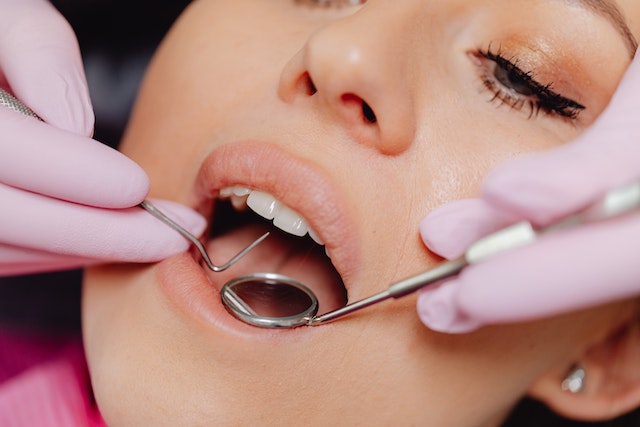Jul
18

Dental cleaning is a vital part of any oral hygiene routine, but can sometimes prove to be a source of anxiety for those of us who still harbour a child-like hesistace about going for a dental check-up.
Let’s not forget the pain factor – if you’ve ever wondered “Why does dental cleaning hurt so much?” while sitting in your dentist’s chair, you’re not the only one. But where does this pain come from, and is there any way to minimise it? The pain experienced during dental cleaning can vary widely from person to person and is influenced by a host of factors – let’s take a look at some key ones below.
Does a Teeth Cleaning Hurt?
If done correctly and routinely, a standard teeth cleaning process should not hurt. The aim of teeth cleaning is to remove plaque and tartar buildup, which are responsible for tooth decay and gum disease. The process typically involves scaling (scraping off tartar from above and below the gum line), polishing, and flossing.
However, discomfort or pain might be experienced by some during these procedures due to various reasons, ranging from pre-existing oral conditions to the patient’s own anxiety levels. Understanding these reasons can help address the discomfort and lead to a more comfortable experience.
Reasons Why Dental Cleaning Might Hurt
Let’s have a look at the five most common reasons that can cause pain during a dental cleaning.
Sensitive Teeth and Gums
One of the common reasons why dental cleaning might hurt is due to the sensitivity of teeth and gums. Some people naturally have sensitive teeth due to thinner enamel or gum recession, which can make the teeth cleaning process uncomfortable. Cold water or air, as well as the pressure applied during cleaning, can stimulate the nerves inside the tooth, leading to a sharp, sudden pain.
Inflammation and Gum Disease
If you have inflamed gums or gum disease (also known as periodontal disease), a dental cleaning can indeed cause discomfort: this is becuase the inflammation can make your gums more sensitive to touch, and scaling around these areas can be painful. Regular cleaning can help prevent such conditions and lead to less painful future appointments.
Deep Tartar Buildup
An excess buildup of tartar (hardened plaque) especially below the gum line can make the cleaning process more intensive, potentially leading to discomfort. Tartar buildup often occurs when regular dental cleaning is neglected, leading to a more intense cleaning session when you do visit the dentist.
Exposed Nerve Endings
Another reason for discomfort during a dental cleaning can be the presence of exposed nerve endings due to gum recession, cavities, or cracks in your teeth. When these sensitive areas come into contact with the dental instruments, water, or air during cleaning, it can stimulate the nerves and cause discomfort or even sharp pain.
For those with exposed nerve endings due to gum recession, gum recession treatment has been proven be helpful in minimising discomfort while also improving the appearance of your gums and teeth.
Anxiety and Tension
Not all reasons for discomfort during dental cleaning are physical, and anxiety and tension can play a significant role in the perception of pain. The fear of dental procedures, known as dental anxiety, can make you hyper-aware of every sensation and cause the cleaning to feel more uncomfortable. In more extreme cases, it could be a sign of dental phobia, a more serious condition that might require therapeutic intervention.
Also Read: 10 Dental Hygiene Tips From our Specialists
How to Minimise Discomfort During Dental Cleanings
Now that we have explored the question “why does dental cleaning hurt so much?”, let’s look at ways to minimise discomfort during dental cleanings:
Regular Dental Hygiene
Maintaining regular dental hygiene can prevent many of the issues that cause pain during dental cleaning. Brushing and flossing twice a day and using mouthwash can help minimise plaque and tartar buildup, reducing inflammation and the risk of gum disease.
Regular Dental Visits
Visiting the dentist for regular check-ups and cleanings can make each cleaning session less intensive and less likely to cause discomfort. It allows for early detection of potential issues like cavities, which can then be addressed before they lead to pain.
Use of Desensitising Products
If you have sensitive teeth, using desensitising toothpaste or mouthwash can help decrease sensitivity. There are also professional treatments your dentist can provide, such as topical agents that help to temporarily numb the area.
Open Communication with Your Dentist or Hygienist
Do not hesitate to let your dentist or hygienist know about your discomfort. They can adjust their techniques, use numbing agents, or provide breaks during the cleaning process to make the experience more comfortable for you.
Anxiety Management
If dental anxiety is causing your discomfort, consider relaxation techniques like deep breathing or listening to calming music during the procedure. Some dentists also offer sedation dentistry for patients with severe dental anxiety.
Read More: How Long Does it Take for Dental Anaesthesia to Wear Off?
The Bottom Line
Overall, while dental cleaning can sometimes be uncomfortable, there are numerous steps both you and your dental professional can take to make it a more comfortable experience. Remember, regular dental cleaning is essential for your oral health, and dealing with a bit of discomfort now can save you from much more significant issues down the line.










